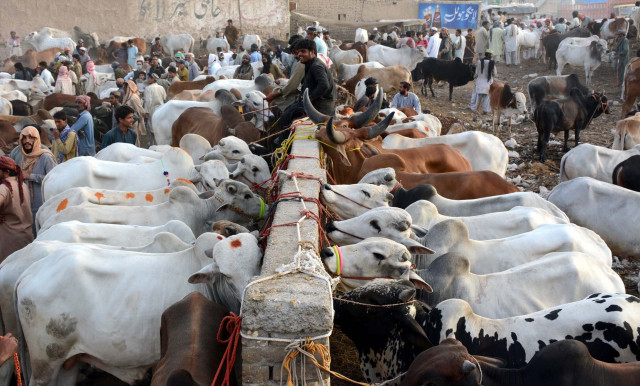Modern cattle rearing can increase farmers’ income: livestock official
Growers in South Punjab lack knowledge about fodder, nutrition, housing and ventilation, says livestock official

PHOTO: FILE
“South Punjab is a hub for livestock farming. However, many cattle farmers lack awareness about modern rearing practices,” he stated while speaking to APP on Sunday.
Makhi cheeni, nugri, nagri and Faisalabadi beetal goats are hugely popular in South Punjab. Farmers should follow modern practices in order to generate more income from these breeds, he maintained.
The farmers in Multan division possess over 2.2 million goats which are an excellent means of earning money for daily expenses in rural areas, he revealed.
Talking about modern farming techniques, the assistant director observed that cattle farmers do not pay attention to maintaining records which detail the total expense incurred in rearing and the money earned. In comparison, poultry farmers keep meticulous records as they are well versed in the difference between the expenses incurred and the final earning, he explained.
Majority of those rearing goats lack sufficient knowledge about fodder, nutrition, housing, ventilation and overcrowding in cattle pens.
He advised farmers to install galvanised wire around pens instead of bamboo; goats are partial to consuming bamboo which is not good for their health. In covered pens, every goat should have enough space, approximately six to 10 square feet. In comparison, in open pens, the distance between the goats should be doubled, he stated.
He also advised farmers to have the animals graze in an open field. Similarly, leaves from kekar trees are also excellent sources of nutrition, he said. When there is a shortage of fodder, farmers can utilise silage, hay and wanda which are chock full of nutrition, he said.
In addition to this, he also advised farmers to ensure that the pens in which the cattle are housed are dry and have plenty of ventilation and exposure to sunlight. “Shelters should be constructed in such manner that temperature and moisture can be controlled easily,” he said.
Similarly, it is not advisable to allow rain water to seep into the pens and the area should be devoid of garbage and trash as these can contribute to the spread of the disease. Cattle farmers should only contact qualified veterinary doctors instead of quacks who ignore diagnostic tests and make major blunders while treating animals, he concluded.



















COMMENTS
Comments are moderated and generally will be posted if they are on-topic and not abusive.
For more information, please see our Comments FAQ